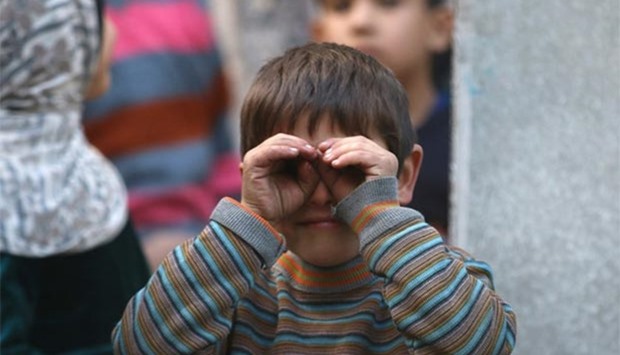Thousands of civilians poured out of rebel areas of Aleppo on Sunday as Syria's army pushed to take the last remnants of opposition-held territory in the devastated city.
President Bashar al-Assad's forces pounded the shrinking rebel enclave in east Aleppo with artillery and air strikes, a monitor said, with more than 10,000 people fleeing the area since midnight.
To the south in Palmyra, a Russian aerial onslaught killed scores of Islamic State group fighters, forcing the jihadists to withdraw from the ancient city just hours after they had re-entered it.
US and Russian officials were expected to continue talks in Geneva on Sunday on trying to reach a ceasefire in Aleppo, but a week of intense diplomatic efforts have failed to stem the fighting.
Heavy bombardment shook the city overnight, AFP correspondents in Aleppo said, as Syria's army and allied forces pursued a weeks-long offensive that has seen them retake about 85% of east Aleppo, a rebel stronghold since 2012.
The Syrian Observatory for Human Rights, a Britain-based monitor, said the 10,000 who had fled since midnight headed to government-held west Aleppo and newly retaken areas in the north and centre of the city.
State news agency SANA said at least 4,000 people had fled rebel districts in just hours on Sunday and were taken by bus to temporary shelters.
'Broken the back' of rebels
Fighting raged on several fronts between opposition and regime forces in southeast Aleppo, the Observatory said, while regime raids and artillery fire continued to pound rebel-held areas.
An AFP correspondent in west Aleppo said that heavy bombardment of the east was heard through the night, and that it was so intense that it rattled windows in western districts.
At least 413 civilians have been killed in east Aleppo since the start of the offensive, according to the Observatory, and 139 killed in rebel rocket fire on the city's west.
At least 80,000 people had already fled eastern Aleppo before Sunday, according to the monitor.
Experts say the retaking of all of Aleppo by Assad's forces appears to be only a matter of time and will deal the biggest blow to Syria's opposition since the start of the country's civil war in 2011.
"We're now past the point where the opposition has any hope of pulling things back," said Yezid Sayigh, a senior associate at the Carnegie Middle East Center in Beirut.
Assad "will have in effect broken the back of the armed opposition... and the idea that the regime can be overcome militarily will be finally put to rest."
Backing from Moscow, which launched an air war in support of Assad last year, has been crucial in the army's ability to make gains.
Overnight Sunday Russian warplanes carried out more than 60 strikes on IS positions Palmyra, killing more than 300 jihadists and halting their latest offensive on the famed desert city in central Syria.
'Aleppo will fall'
On Saturday the jihadists, who were forced out of Palmyra by Syrian troops in March, had taken most of the city back under their control and surrounded the airport.
"Intense Russian raids since last night forced IS out of Palmyra, hours after the jihadists retook control of the city," said Observatory chief Rami Abdel Rahman.
The retaking of Palmyra, a Unesco World Heritage site famed for its Roman-era ruins, was considered a major symbolic victory for Assad's forces.
The heavy fighting in Aleppo has prompted widespread international concern but despite a series of meetings diplomats have been unable to reach a deal on halting the violence.
"It looks now as if sadly Aleppo will fall," British Defence Secretary Michael Fallon told BBC television on Sunday.
Moscow said a deal was being discussed with Washington, which has supported opposition forces against Assad, for a ceasefire and full rebel withdrawal from Aleppo.
So far there has been no sign of an agreement, though talks between Russian and US officials were due in Geneva on Sunday and in the coming days.
After meetings in Paris on Saturday, Western and Arab powers called for talks between the regime and opposition to end the war.
US Secretary of State John Kerry, who called the regime's bombings of Aleppo "war crimes", said the time was ripe for a return to negotiations.
Now that the rebels "are about to lose Aleppo, conceivably... I think the best thing they can do is get to the table and negotiate. Because they can still win a political settlement that honours the fight and all they've invested," Kerry said.

A boy reacts to a photographer while waiting to fill containers with water in a rebel-held besieged area of Aleppo on Saturday.
